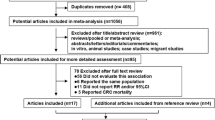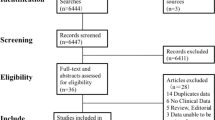Abstract
Purpose
The association of habitual behaviors with the prevalence of synchronous colorectal cancer (sCRC) is unknown. Here, we investigated whether these behaviors, which are known risk factors for colorectal polyps, may be related to sCRC risk.
Methods
We enrolled 17,093 patients who underwent cancer treatment between January 1995 and December 2016 and examined the association of age, sex, familial history of hereditary colorectal cancer (CRC), and status of three common habitual behaviors (smoking and alcohol and coffee consumption) with the prevalence of sCRC.
Results
Of the enrolled patients, 960 (5.6%) patients had sCRC. The independent risk factors for sCRC prevalence included advanced age, male sex, hereditary CRC, smoking, and daily alcohol consumption of more than one bottle (> 600 mL). Contrary to these factors, daily coffee consumption of more than one cup seemed to provide a protection from sCRC. In the Kaplan-Meier test, the significantly worse 5-year overall survival (OS) was noted in smokers with stage 0–III CRC. The effect of alcohol consumption on 5-year OS was significant in stages II and III. Compared with those without daily coffee consumption, patients with daily coffee consumption had significantly higher 5-year OS in stages I (93.0% vs. 86.4%), II (87.1% vs. 77.2%), III (71.5% vs. 61.9%), and IV (18.0% vs. 13.0%).
Conclusions
sCRC prevalence was significantly associated with habitual behaviors. Patients with smoking or with daily alcohol consumption of one bottle had higher sCRC prevalence than did those without these habits. Coffee consumption could be a protective factor for lowering sCRC risk.




Similar content being viewed by others
References
Parkin DM, Bray FI, Devesa SS (2001) Cancer burden in the year 2000. The global picture. Eur J Cancer 37(suppl 8):S4–S66
Shibuya K, Mathers CD, Boschi-Pinto C, Lopez AD, Murray CJ (2002) Global and regional estimates of cancer mortality and incidence by site: II. Results for the global burden of disease 2000. BMC Cancer 2:37
World Health Organization (2014) International Agency for Research on Cancer, World cancer report 2014. pp 392–402: Stewart BW and Wild CP (eds)
Wang Y, Duan H, Yang H, Lin J (2015) A pooled analysis of alcohol intake and colorectal cancer. Int J Clin Exp Med 8:6878–6889
Slattery ML, Potter J, Caan B, Edwards S, Coates A, Ma KN, Berry TD (1997) Energy balance and colon cancer--beyond physical activity. Cancer Res 57:75–80
Liang PS, Chen TY, Giovannucci E (2009) Cigarette smoking and colorectal cancer incidence and mortality: systematic review and meta-analysis. Int J Cancer 124:2406–2415
Li G, Ma D, Zhang Y, Zheng W, Wang P (2013) Coffee consumption and risk of colorectal cancer: a meta-analysis of observational studies. Public Health Nutr 16:346–357
Lee KJ, Inoue M, Otani T, Iwasaki M, Sasazuki S, Tsugane S, JPHC Study Group Int (2007) Coffee consumption and risk of colorectal cancer in a population-based prospective cohort of Japanese men and women. J Cancer 121:1312–1318
Schmit SL, Rennert HS, Rennert G, Gruber SB (2016) Coffee consumption and the risk of colorectal cancer. Cancer Epidemiol Biomark Prev 25:634–639
Thiels CA, Naik ND, Bergquist JR, Spindler BA, Habermann EB, Kelley SR, Wolff BG, Mathis KL (2016) Survival following synchronous colon cancer resection. J Surg Oncol 114:80–85
Latournerie M, Jooste V, Cottet V, Lepage C, Faivre J, Bouvier AM (2008) Epidemiology and prognosis of synchronous colorectal cancers. Br J Surg 95:1528–1533
World Health Organization (2008) Worldwide prevalence of anemia 1993–2005: WHO global database on anaemia: de Benoist B, McLean E, Egli I and Cogswell M (eds). World Health Organization. http://www.who.int/iris/handle/10665/43894
Wanebo HJ, Rao B, Pinsky CM, Hoffman RG, Stearns M, Schwartz MK, Oettgen HF (1978) Preoperative carcinoembryonic antigen level as a prognostic indicator in colorectal cancer. N Engl J Med 299:448–451
Wang WS, Lin JK, Chiou TJ, Liu JH, Fan FS, Yen CC, Lin TC, Jiang JK, Yang SH, Wang HS, Chen PM (2000) Preoperative carcinoembryonic antigen level as an independent prognostic factor in colorectal cancer. Jpn J Clin Oncol 30:12–16
Vasen HF, Watson P, Mecklin JP, Lynch HT (1999) New clinical criteria for hereditary nonpolyposis colorectal cancer (HNPCC, Lynch syndrome) proposed by the international collaborative group on HNPCC. Gastroenterology 116:1453–1456
Lam AK, Chan SS, Leung M (2014) Synchronous colorectal cancer: clinical, pathological and molecular implications. World J Gastroenterol 20:6815–6820
Chin CC, KuoYH CJM (2018) Synchronous colorectal carcinoma: predisposing factors and characteristics. Colorectal Dis 21:432–440. https://doi.org/10.1111/codi.14539
Reid ME, Marshall JR, Roe D, Lebowitz M, Alberts D, Battacharyya AK, Martinez ME (2003) Smoking exposure as a risk factor for prevalent and recurrent colorectal adenomas. Cancer Epidemiol Biomark Prev 12:1006–1011
Jacobson JS, Neugut AI, Murray T, Garbowski GC, Forde KA, Treat MR, Waye JD, Santos J, Ahsan H (1994) Cigarette smoking and other behavioral risk factors for recurrence of colorectal adenomatous polyps (New York City, NY, USA). Cancer Causes Control 5:215–220
Bagnardi V, Blangiardo M, La Vecchia C, Corrao G (2001) A meta-analysis of alcohol drinking and cancer risk. Br J Cancer 85:1700–1705
Erhardt JG, Kreichgauer HP, Meisner C, Bode JC, Bode C (2002) Alcohol, cigarette smoking, dietary factors and the risk of colorectal adenomas and hyperplastic polyps--a case control study. Eur J Nutr 41:35–43
Wallace K, Grau MV, Ahnen D, Snover DC, Robertson DJ, Mahnke D, Gui J, Barry EL, Summers RW, McKeown-Eyssen G, Haile RW, Baron JA (2009) The association of lifestyle and dietary factors with the risk for serrated polyps of the colorectum. Cancer Epidemiol Biomark Prev 18:2310–2317
Haque TR, Bradshaw PT, Crockett SD (2014) Risk factors for serrated polyps of the colorectum. Dig Dis Sci 59:2874–2889
Figueiredo JC, Crockett SD, Snover DC, Morris CB, McKeown-Eyssen G, Sandler RS, Ahnen DJ, Robertson DJ, Burke CA, Bresalier RS, Church JM, Church TR, Baron JA (2015) Smoking-associated risks of conventional adenomas and serrated polyps in the colorectum. Cancer Causes Control 26:377–386
Nosho K, Kure S, Irahara N, Shima K, Baba Y, Spiegelman D, Meyerhardt JA, Giovannucci EL, Fuchs CS, Ogino S (2009) A prospective cohort study shows unique epigenetic, genetic, and prognostic features of synchronous colorectal cancers. Gastroenterology 137:1609–1620
Drew DA, Nishihara R, Lochhead P, Kuchiba A, Qian ZR, Mima K, Nosho K, Wu K, Wang M, Giovannucci E, Fuchs CS, Chan AT, Ogino S (2017) A prospective study of smoking and risk of synchronous colorectal cancers. Am J Gastroenterol 112:493–501
Shrubsole MJ, Wu H, Ness RM, Shyr Y, Smalley WE, Zheng W (2008) Alcohol drinking, cigarette smoking, and risk of colorectal adenomatous and hyperplastic polyps. Am J Epidemiol 167:1050–1058
Lieberman DA, Prindiville S, Weiss DG, Willett W, VA Cooperative Study Group 380 (2003) Risk factors for advanced colonic neoplasia and hyperplastic polyps in asymptomatic individuals. JAMA 290:2959–2967
Cope GF, Wyatt JI, Pinder IF, Lee PN, Heatley RV, Kelleher J (1991) Alcohol consumption in patients with colorectal adenomatous polyps. Gut 32:70–72
Breuer-Katschinski B, Nemes K, Marr A, Rump B, Leiendecker B, Breuer N, Goebell H (2000) Alcohol and cigarette smoking and the risk of colorectal adenomas. Dig Dis Sci 45:487–493
Tiemersma EW, Wark PA, Ocké MC, Bunschoten A, Otten MH, Kok FJ, Kampman E (2003) Alcohol consumption, alcohol dehydrogenase 3 polymorphism, and colorectal adenomas. Cancer Epidemiol Biomark Prev 12:419–425
Moskal A, Norat T, Ferrari P, Riboli E (2007) Alcohol intake and colorectal cancer risk: a dose-response meta-analysis of published cohort studies. Int J Cancer 120:664–671
Anderson JC, Alpern Z, Sethi G, Messina CR, Martin C, Hubbard PM, Grimson R, Ells PF, Shaw RD (2005) Prevalence and risk of colorectal neoplasia in consumers of alcohol in a screening population. Am J Gastroenterol 100:2049–2055
Nagata C, Shimizu H, Kametani M, Takeyama N, Ohnuma T, Matsushita S (1999) Cigarette smoking, alcohol use, and colorectal adenoma in Japanese men and women. Dis Colon Rectum 42:337–342
Kim JH, Lim YJ, Kim YH, Sung IK, Shim SG, Oh SO, Park SS, Yang S, Son HJ, Rhee PL, Kim JJ, Rhee JC, Choi YH (2007) Is metabolic syndrome a risk factor for colorectal adenoma? Cancer Epidemiol Biomark Prev 16:1543–1546
Yamada K, Araki S, Tamura M, Sakai I, Takahashi Y, Kashihara H, Kono S (1997) Case-control study of colorectal carcinoma in situ and cancer in relation to cigarette smoking and alcohol use (Japan). Cancer Causes Control 8:780–785
Morimoto LM, Newcomb PA, Ulrich CM, Bostick RM, Lais CJ, Potter JD (2002) Risk factors for hyperplastic and adenomatous polyps: evidence for malignant potential? Cancer Epidemiol Biomark Prev 11:1012–1018
Kune GA, Bannerman S, Watson LF (1992) Attributable risk for diet, alcohol, and family history in the Melbourne Colorectal Cancer Study. Nutr Cancer 18:231–235
Seitz HK, Maurer B, Stickel F (2005) Alcohol consumption and cancer of the gastrointestinal tract. Dig Dis 23:297–303
Gan Y, Wu J, Zhang S, Li L, Cao S, Mkandawire N, Ji K, Herath C, Gao C, Xu H, Zhou Y, Song X, Chen S, Chen Y, Yang T, Li J, Qiao Y, Hu S, Yin X, Lu Z (2017) Association of coffee consumption with risk of colorectal cancer: a meta-analysis of prospective cohort studies. Oncotarget 8:18699–18711
Galeone C, Turati F, La Vecchia C, Tavani A (2010) Coffee consumption and risk of colorectal cancer: a meta-analysis of case-control studies. Cancer Causes Control 21:1949–1959
Kashino I, Akter S, Mizoue T, Sawada N, Kotemori A, Matsuo K, Oze I, Ito H, Naito M, Nakayama T, Kitamura Y, Tamakoshi A, Tsuji I, Sugawara Y, Inoue M, Nagata C, Sadakane A, Tanaka K, Tsugane S, Shimazu T, Research Group for the Development and Evaluation of Cancer Prevention Strategies in Japan (2018) Coffee drinking and colorectal cancer and its subsites: a pooled analysis of 8 cohort studies in Japan. Int J Cancer 143:307–316
Setiawan VW, Wilkens LR, Lu SC, Hernandez BY, Le Marchand L, Henderson BE (2015) Association of coffee intake with reduced incidence of liver cancer and death from chronic liver disease in the US multiethnic cohort. Gastroenterology 148:118–125
Sang LX, Chang B, Li XH, Jiang M (2013) Consumption of coffee associated with reduced risk of liver cancer: a meta-analysis. BMC Gastroenterol 13:34
Akter S, Kashino I, Mizoue T, Matsuo K, Ito H, Wakai K, Nagata C, Nakayama T, Sadakane A, Tanaka K, Tamakoshi A, Sugawara Y, Sawada N, Inoue M, Tsugane S, Sasazuki S, for the Research Group for the Development and Evaluation of Cancer Prevention Strategies in Japan (2016) Coffee drinking and colorectal cancer risk: an evaluation based on a systematic review and meta-analysis among the Japanese population. Jpn J Clin Oncol 46:781–787
Cao S, Liu L, Yin X, Wang Y, Liu J, Lu Z (2014) Coffee consumption and risk of prostate cancer: a meta-analysis of prospective cohort studies. Carcinogenesis 35:256–261
Araújo JR, Gonçalves P, Martel F (2011) Chemopreventive effect of dietary polyphenols in colorectal cancer cell lines. Nutr Res 31:77–87
Cavin C, Holzhaeuser D, Scharf G, Constable A, Huber WW, Schilter B (2002) Cafestol and kahweol, two coffee specific diterpenes with anticarcinogenic activity. Food Chem Toxicol 40:1155–1163
Author information
Authors and Affiliations
Corresponding author
Additional information
Publisher’s note
Springer Nature remains neutral with regard to jurisdictional claims in published maps and institutional affiliations.
A brief description
This study explored the relationship of smoking and alcohol and coffee consumption with synchronous colorectal cancer (sCRC) prevalence. We investigated whether these known habitual behaviors, which can lead to colorectal polyps, are associated with sCRC occurrence. We noted that the effects of these three habitual behaviors on colorectal cancer (CRC) prognosis differed in each stage. These findings could help in implementing appropriate CRC prevention strategies.
Rights and permissions
About this article
Cite this article
Kuo, YH., Hung, HY., You, JF. et al. Common habitual behaviors and synchronous colorectal cancer risk: a retrospective case-control study. Int J Colorectal Dis 34, 1421–1430 (2019). https://doi.org/10.1007/s00384-019-03326-x
Accepted:
Published:
Issue Date:
DOI: https://doi.org/10.1007/s00384-019-03326-x




